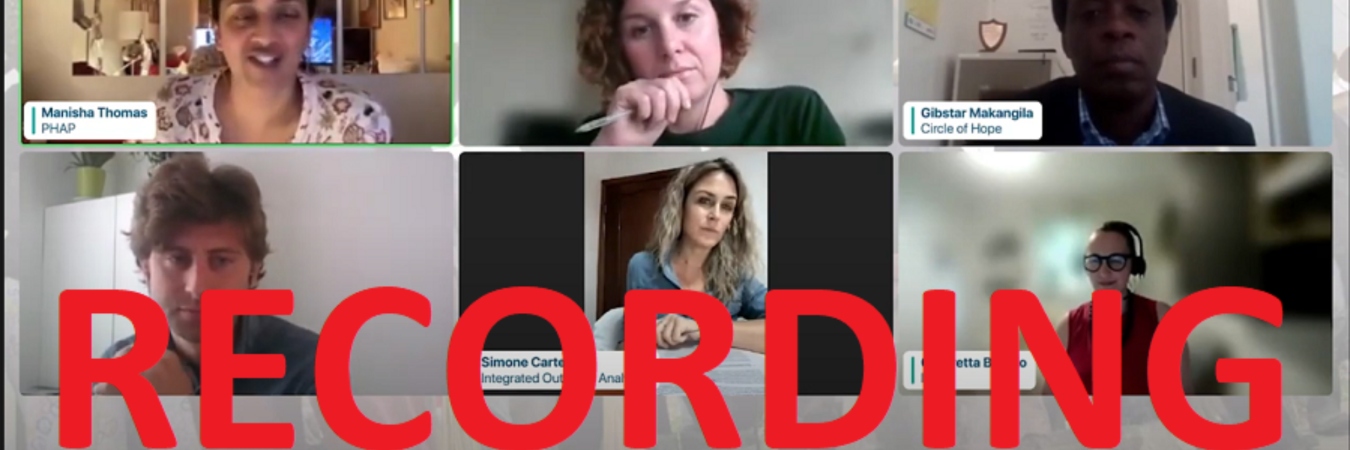
Recording Now Available for the Fourth Session in Humanitarian Networks and Partnerships Weeks (HNPW) Event Series on AAP
Access the audio and video recordings of the IASC and PHAP webinar on the importance of using community-based data in emergency responses
On 19 May, PHAP and the Inter-Agency Standing Committee (IASC) organized the fourth session in the 2022 Humanitarian Networks and Partnerships Weeks series on accountability to affected populations (AAP). Drawing from the experience of the Collective Service, this session will show examples of how a collective approach to community engagement coordination can make a difference in the response in communities facing multiple threats and where the same partners respond simultaneously to public health, humanitarian, and other emergencies.
On 19 May, PHAP and the Inter-Agency Standing Committee (IASC) organized the fourth session in the 2022 Humanitarian Networks and Partnerships Weeks series on accountability to affected populations (AAP). Drawing from the experience of the Collective Service, this session will show examples of how a collective approach to community engagement coordination can make a difference in the response in communities facing multiple threats and where the same partners respond simultaneously to public health, humanitarian, and other emergencies.
During this event, participants had the chance to hear from Silvia Magnoni, Global Coordinator, Collective Service for Risk Communication and Community Engagement (RCCE) who explained what the Collective Service is. She also spoke on why the collective service is critical in ensuring accountability to affected populations and how it fits with all the other AAP initiatives. Gibstar Makangila, Executive Director, Circle of Hope, provided specific examples of how community-based data is used in programming in Zambia. He noted lessons on community engagement to the COVID-19 response such as ensuring early response, listening to the community, decentralizing response, proper customer care and, utilizing as first responders.
Joren Raymenants, MD, PHD researcher, KU Leuven shared lessons from the COVID response among students in Leuven in Belgium. He spoke on how data and community information can be used to improve contact tracing and build trust. Lessons such as decentralized data collection, having peers collect data, and linking data collection to service delivery, as transferrable initiatives of the COVID response.
Simone Carter, Lead, Integrated Outbreak Analytics (IOA), UNICEF Public Health Emergencies and Manager, Cellule d’Analyse Intégrée (CAI) provided a different perspective of the Ebola response in DR Congo which was further complicated by the COVID-19 response. She highlighted the effectiveness of the IOA, which keeps users and decision makers in mind from the onset of the analysis. Ombretta Baggio, CEA Senior Advisor, IFRC, shared on their research in the DR Congo using community feedback for decision-making and the Red Cross’s work in DRC in community feedback data systems for collective action. She shared on how (and why) community feedback can be included in decision-making processes during outbreak response.
Speaking on the Collective Service’s experience in the Eastern and Southern Africa region was Ngoni Nyambawaro, Inter-Agency Country Support Officer, Eastern and Southern Africa, Collective Service for Risk Communication and Community Engagement (RCCE). He briefed participants on how social data can be meaningfully used to shape the response during epidemics or other humanitarian crises.
This event is the fourth in the series following the first session that explored working towards collective AAP approaches at country level; second session on standardized complaints and feedback mechanisms for AAP and the third on the key actions required from humanitarian leadership to make AAP a reality.
If you missed out on this event, you can now access the video and audio podcast format recordings of the discussion on the event page.
Access the recordings